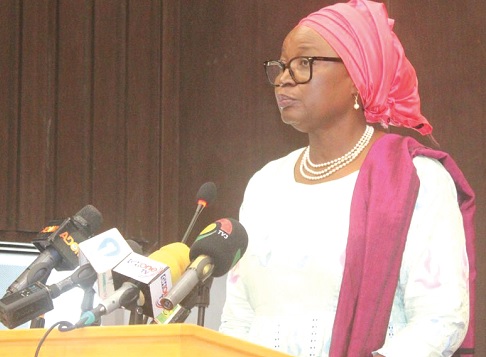
Human rights body urges Ghana to ratify outstanding instruments
The African Commission on Human and Peoples’ Rights (ACHPR) has urged the government to prioritise the immediate ratification of all outstanding regional human rights instruments.
The ACHPR also urged the government to honour its commitment to submit all overdue State Reports by the end of 2025 through a participatory process that includes civil society.
Speaking at a press briefing in Accra last Thursday, (October 2, 2025), the Commissioner responsible for the promotion of human rights in Ghana and Special Rapporteur on the Rights of Women in Africa, Janet Ramatoulie Sallah-Njie, said the country’s engagement with the African human rights system was critically deficient, marked by a 24-year delay in submitting State Reports under Article 62 of the African Charter.
Ms Sallah-Njie said that was compounded by the non-ratification of seven key instruments, including the “The African Union Convention for the Protection and Assistance of Internally Displaced Persons in Africa; the Protocol to the African Charter on Human and Peoples’ Rights on the Rights of Older Persons in Africa; the Protocol to the African Charter on Human and Peoples’ Rights on the Rights of Persons with Disabilities”.
Others
The rest were “the Protocol to the African Charter on Human and Peoples' Rights on the Rights to Social Protection and Social Security; the Protocol to the African Charter on Human and Peoples’ Rights Relating to the Specific Aspects of the Right to a Nationality and the Eradication of Statelessness in Africa and the African Union Convention on the Elimination of Violence Against Women and Girls”.
She indicated that the country had also not deposited the Article 34(6) declaration, which denies its citizens and Non-governmental Organisations (NGOs) direct access to the African Court on Human and Peoples’ Rights. She urged the government to do so, to grant its citizens access to the African Court on Human and Peoples’ Rights.
Galamsey crisis
Ms Sallah-Njie said the environmental and public health crisis driven by illegal mining, popularly known as “galamsey,” has escalated to a level that threatens national stability.
She said the menace was not merely an environmental issue but a complex human rights emergency resulting in the destruction of the environment and other social vices in the galamsey zones.
“The galamsey crisis has resulted in widespread contamination of water bodies with heavy metals such as mercury; devastation of agricultural lands, particularly cocoa farms, which form a backbone of the national economy, threatens food security and livelihoods.
“It has also contributed to high school dropout rates in affected communities, as children are lured into mining, jeopardising the future of a generation.
The phenomenon is entrenched due to the reported complicity of political actors and the compromise of security forces posted to combat it,” she said.
The commissioner also added that the galamsey zones were also hotspots for child trafficking and the sexual exploitation of vulnerable groups.
“Women who live in and around areas where galamsey is prevalent find themselves exposed to hazardous environments, which adversely affect their sexual and reproductive health.
The health and well-being of children who live in and around affected areas are also adversely affected,” the commissioner stated.
